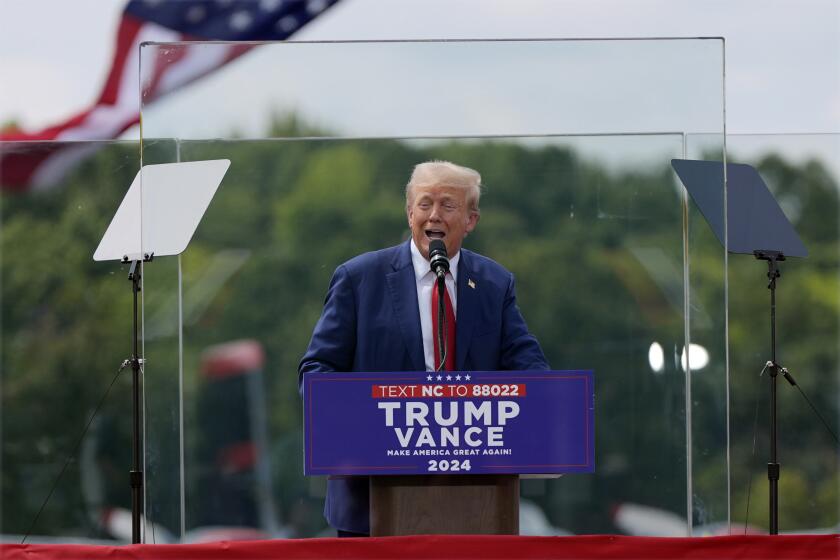Nicaragua Spoiling Peace Drive, Reagan Tells U.N.
In his final appearance before the U.N. General Assembly, President Reagan on Monday said the “continuing deterioration of human rights in Nicaragua” is “the one exception” to progress in ending worldwide hostilities, adding that the Central American conflict poses a “risk” to Soviet-American relations.
Reagan, citing progress in peace efforts in many other regions of the world, including Afghanistan, called on the Soviet Union to show the “same spirit of constructive realism” it has displayed elsewhere by cutting its massive aid to the Nicaraguan government.
Nicaraguan diplomats and Soviet Foreign Minister Eduard A. Shevardnadze sat motionless as Reagan called on the Soviet Union “to assist in bringing conflict in Central America to a close by halting the flow of billions of dollars’ worth of arms and ammunition to the Sandinista regime.”
The President noted that U.S.-Soviet negotiators already have signed the medium-range missile agreement and asserted there is “more than a possibility” that the two countries will agree on a strategic arms treaty within a year, cutting strategic nuclear weapons by half in the two countries.
During the 38-minute speech, his seventh before the world body, Reagan called for “a verifiable, truly global ban” on chemical weapons and for the convening of an international conference to accomplish that end. The use of such weapons in the Persian Gulf War, he said, not only has taken a “tragic human toll” but also has jeopardized “the moral and legal strictures that have held these weapons in check since World War I.”
Later, White House spokesman Marlin Fitzwater told a news conference that the conference envisioned by the President would focus on banning the “production, use and transfer” of chemical weapons and would “re-emphasize and reiterate” the 1925 Geneva Protocol that outlaws the weapons.
He said that 125 countries should be asked to participate in such a conference and that the United States would “invite and urge” combatants Iran and Iraq to take part.
Fitzwater said no date has been suggested for a conference but that the Administration would like it to begin before Reagan leaves office in January. He said the United Nations would be asked to help arrange the meeting and that the talks should be linked to ongoing disarmament talks in Geneva.
In his speech, Reagan took a position toward the United Nations that has softened dramatically since he first addressed the organization in 1982. After encouraging Congress to withhold this country’s U.N. assessments for four years amid charges that the organization wasted money, he said Monday that the United States now is “determined” that the organization “should succeed and serve the cause of peace for humankind.”
Reagan cited progress in several regional conflicts, including those in the Persian Gulf, southern Africa and Southeast Asia, and credited the world body for its efforts. As examples of positive U.N. efforts, he pointed to the Iran-Iraq cease-fire, agreed to last July, the prospects of a withdrawal of Cuban troops from Angola and the removal of Vietnamese forces from Cambodia.
‘Out of Control’
“Only a few years ago,” Reagan said, directing his remarks to U.N. Secretary General Javier Perez de Cuellar, “all of these and other conflicts were burning dangerously out of control.” The Soviet invasion of Afghanistan and the “apparent failure of will” among other nations to oppose it were part of a climate in which aggression constituted an “epidemic” among both small and large countries, he added.
“And now,” Reagan said, noting the Soviet agreement to withdraw troops from Afghanistan, “the United Nations is providing valuable assistance in helping this epidemic to recede.”
However, he went on to “take note of the one exception to progress in regional conflicts,” lambasting the Nicaraguan government as a “totalitarian regime” and vowing to continue urging Congress to support the Contras in that country.
Reagan warned that the Nicaraguan government’s “goals of regional domination--while ultimately doomed--can continue to cause great suffering to the people of that area and risk to Soviet-American relations . . . unless action is taken now.”
Immediate reaction to the President’s speech was most vocal from the Arabs, who condemned his lack of criticism of Israel’s treatment of Palestinians in the occupied West Bank and Gaza Strip.
No Palestinian Mention
“He underscored human rights, but he didn’t mention the right to life for Palestinians,” declared Zehdi Labib Terzi, head of the Palestine Liberation Organization’s observer mission here.
Clovis Maksoud, secretary general of the Arab League, also criticized Reagan for not mentioning Palestinian and other Muslim victims of human rights violations in the Middle East.
“The omission of any mention of the situation in Lebanon was felt by us,” said Maksoud, a native of that country.
And while Shevardnadze joined in applause for the President at the end of his speech, a Soviet spokesman, who declined to be identified by name, expressed resentment that Reagan gave no credit to Moscow in speaking of progress toward peace in Afghanistan and in the Iran-Iraq War.
“Without (Soviet leader Mikhail S.) Gorbachev, Reagan would have been standing there with not much to say,” the Soviet spokesman said.
As he has repeatedly done, the President again credited U.S. intentions to develop space-based missile defenses--his Strategic Defense Initiative--with bringing the Soviets to the bargaining table. He said he has received recent briefings indicating that progress on the controversial program, also known as “Star Wars,” “may be even more rapid and less costly than we had at first thought.”
Reagan said the United States “reaffirms its commitment to its Strategic Defense Initiative and our offer to share the benefits of strategic defenses with others.”
More to Read
Sign up for Essential California
The most important California stories and recommendations in your inbox every morning.
You may occasionally receive promotional content from the Los Angeles Times.










